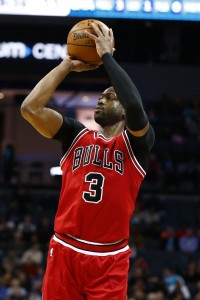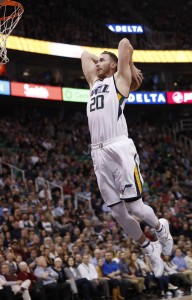With the NBA’s salary cap on the rise, most veterans who faced player option decisions a year ago chose to opt out of their deals in search of a larger payday. In fact, only three of last year’s 29 player options were exercised, and none of the three players who picked up their options – Tim Duncan, Mo Williams, and Caron Butler – have played an NBA game since then.
That trend will almost certainly continue this season, albeit perhaps not to the same extreme. For the most part, if a player remains healthy and productive headed into the offseason, he’s far more likely to turn down his player option in search of a longer-term deal than he is to opt in for one more season.
That’s not necessarily true in every case though. There are a handful of big-name players facing option decisions who aren’t considered locks to decline those options, for a variety of reasons. Let’s dive in and examine some of those looming player option decisions…
Dwyane Wade
Team: Chicago Bulls
Option value: $23,800,000
In free agency last summer, Wade reportedly received multiple offers in the same range as the Bulls’ $47MM proposal. The Heat’s two-year offer was believed to be worth a little less, while the Nuggets’ offer was said to be worth a little more.
A year later, Wade is coming off one of the worst seasons of his long and productive career. His .434 FG% and 3.9 APG represent career lows, and his 18.6 PPG is his worst mark since his rookie season, though the same can be said about his 30.2 MPG — his per-minute scoring numbers didn’t drop off significantly. The 35-year-old is also currently recovering from an elbow fracture.
If Wade were to opt out and become a free agent, it seems unlikely that he’d inspire a bidding war like last year’s. But he’s still an incredibly talented scorer, and I expect he’d receiver offers on the open market worth more than $23.8MM overall, even if his salary for 2017/18 wouldn’t be quite that high.
It’s also worth noting that Wade’s year in Chicago hasn’t exactly represented the storybook homecoming he might have hoped for. The Bulls’ season has been marred with dysfunction, rotation confusion, and a late-season slide that will likely keep the club out of the playoffs. Even if Wade isn’t confident in his ability to land more money in free agency, perhaps he’ll want to decline his option just to have the opportunity to choose a new team.
Rudy Gay
Team: Sacramento Kings
Option value: $14,263,566
Back in September, Gay informed the Kings that he intended to opt out of his contract in the summer of 2017, and it sounded at the time like Gay would probably be leaving Sacramento. Six months later though, he’s less certain about his future.
Much of that uncertainty can be attributed to his health. If Gay were finishing out the season strong and potential suitors this summer didn’t have to worry about injuries, opting out would be an easy choice. But Gay continues to recover from an Achilles tendon tear, which he suffered in January.
Shortly after suffering the injury, Gay issued a statement that was aggressively optimistic about his rehab, suggesting that he fully anticipates being ready for the start of the 2017/18 season. Even if that’s the case though, will teams in July be prepared to bid on Gay with full confidence?
The veteran forward may prefer to leave Sacramento, but it might ultimately make more sense for him to opt in, take his time getting back to full strength, and hit the market in the summer of 2018 after rebuilding his value. The Kings’ trade of DeMarcus Cousins last month signaled a significant change of direction for the franchise, so they might even look to trade Gay to a more favorable destination for him if he does opt in.
Gordon Hayward
Team: Utah Jazz
Option value: $16,736,710
On its surface, Hayward’s player option decision looks like an easy one. He has been one of the best forwards in the NBA this season, and he’ll be in line for a maximum-salary contract – or something very close to it – if he hits free agency this summer.
However, Hayward’s place among the NBA’s top forwards is exactly what complicates his option decision. As Dan Feldman of Pro Basketball Talk outlines, earning a spot on one of the three All-NBA teams this year would make Hayward eligible for a designated veteran extension from Utah, meaning he could earn up to 35% of the cap instead of 30% — but only if he picks up his player option and then signs a new extension.
Becoming one of those six All-NBA forwards won’t be an easy task for Hayward, given his competition. But the situation creates an interesting predicament for the Jazz. Would they want Hayward to earn an All-NBA spot and become eligible for that more expensive extension? It would likely increase their chances of keeping him, but it would also mean potentially tying up a ton of money in a player who is probably one or two tiers below the NBA’s top superstars.
Pau Gasol
Team: San Antonio Spurs
Option value: $16,197,500
After earning All-Star nods in each of his two seasons with the Bulls, Pau Gasol has had to adjust to a reduced role this season in San Antonio. Gasol’s 25.7 minutes per contest this season is easily a career low, but he has been about as effective as you’d expect when he does play — his .504 FG% is his best since 2011/12.
Gasol will turn 37 this summer, and if he decides to opt out and return to free agency, potential suitors would have to determine whether his reduced role is simply a result of playing in the Spurs’ system, or if he’s getting to a point in his career where he’s no longer capable of being a full-time, All-Star-caliber starter.
At 52-15, the Spurs have the NBA’s second-best record and look like one of the few teams with a legit chance to win this year’s championship. Depending on how the postseason plays out, Gasol could continue to prioritize that title chase and opt in for another year in San Antonio. But if he’d prefer to join a team that would give him one more chance to play 30+ minutes per game, perhaps he’ll opt out look elsewhere.
Greg Monroe
Team: Milwaukee Bucks
Option value: $17,884,176
The uncertainty surrounding Monroe’s player option was one reason why the Bucks had such a hard time trading him over the last year or so. Teams wanting to secure Monroe for multiple years were worried that he’d opt out in 2017, while teams wanting to acquire him while maintaining cap flexibility for the 2017/18 season were concerned that he’d opt in.
As Monroe prepares to finish another season with the Bucks, that option decision doesn’t look any clearer. His fit in Milwaukee wasn’t great initially, but like Gasol in San Antonio, he has adjusted to a role off the bench this season and is playing some very efficient ball.
Monroe’s 18.8 points per 36 minutes represent a career high, and his .528 FG% is his best since his rookie year — while he may not be having the sort of impact you’d expect from a player earning his kind of salary, the former seventh overall pick has been a key piece of the Bucks’ rotation as an interior scorer off the bench.
Still, Monroe is still just 26 years old, and his strong play in limited minutes for Milwaukee this season may convince him that he should have a larger role. If that’s the case, it wouldn’t be a surprise to see him turn down a 2017/18 payday of nearly $18MM in search of a team that can give him that larger role, along with a longer-term contract.
Photos courtesy of USA Today Sports Images.

Can you hear me now?
I’m talking on the phone with my cousin from Alabama.
Ye country yep goo.
^^^^ Ahahahaha haha you so funny
Kings fan here. Rudy Gay said he wanted to play elsewhere before he got injured and now he’s unsure. And I say adios amigo don’t let the door hit you on your way out or any Kings players who don’t want to be in Sacramento. Its the best fan base in the NBA we will survive if Rudy Gay leaves.